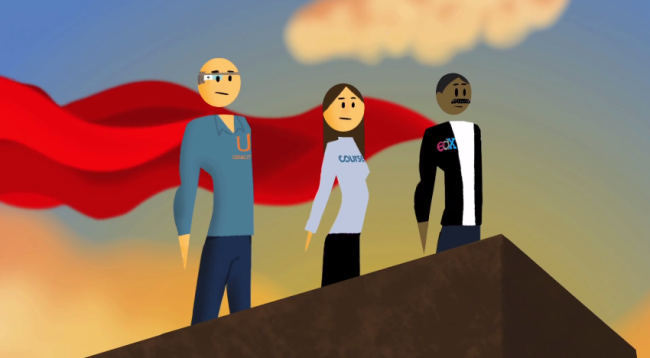You have /5 articles left.
Sign up for a free account or log in.

Cartoon versions of Sebastian Thrun, Daphne Koller and Anant Agarwal.
Campaign for the Future of Higher Education
The faculty leaders behind the Campaign for the Future of Higher Education continued their barrage against massive open online courses on Tuesday, challenging the providers to come clean on “overblown, misleading or simply false” rhetoric.
In letters blasted off last week to the founders of Coursera, edX and Udacity, the organization expresses its concern that the MOOC providers are motivated not by the “needs of our students, but the needs of [their] investors.”
“Higher education institutions, policy makers, families and taxpayers deserve the facts about MOOCs and similar forms of online education,” the letters read. “They should not be misled by wondrous promises of cheap and easy solutions.”
The organization has long been a critical voice against MOOCs. Its members cheered the signs of MOOC fatigue seen in 2013, but even as the hype has leveled off, the organization has kept up its offensive. Last October, the group released a series of working papers criticizing online learning and the influence of for-profit entities in higher education, arguing the debate ignored questions of quality in favor of “[focusing] squarely and exclusively on what will make money for particular companies.”
The organization stresses in the letters that it is opposed neither to technology in education nor to companies making a profit, only to the rhetoric some of those companies use about their products.
“But promising more than your products can deliver can hurt our students when they are herded into huge online courses where they have little chance of success,” the letters read. “Promising more than your products deliver can also hurt our colleges and universities when they are pressured to jump on the bandwagon created by your high-profile promotion of online courses.”
In addition to the letters, the group released an animated video (embedded below), complete with cartoon representations of Coursera’s Daphne Koller, edX’s Anant Agarwal and Udacity’s Sebastian Thrun wearing superhero capes intercut with footage of the three touting the ability of MOOCs to democratize education around the world. Agarwal, for example, is seen saying online education is "the single biggest change in education since the printing press."
“Bottom line: That promise of free high-quality education for those who need it most? It just doesn’t add up,” a narrator says. “Despite the failure to deliver, online boosters still promote themselves as new-age saviors.” Later, the video features Judge Judy issuing a stern warning about online institutions and an argument comparing the rise of MOOCs to the subprime mortgage crisis.
The video and accompanying social media campaign are an attempt to reach a broader audience -- student groups, families and people outside academe -- than those who read the working papers, said Lillian Taiz, professor of history at California State University at Los Angeles and president of the California Faculty Association.
“We needed to find a way to communicate our deep concern about what’s going on to see if these are issues that other schools find of concern as well,” Taiz said in an interview. “Part of what the Campaign for the Future of Higher Education wants to do is begin a broader dialog about all these issues so it isn’t only faculty members talking to each other, administrators talking to each other, but that we really reach out to parents and kids who are being exposed to this stuff.”
The campaign is also an invitation to the MOOC providers to engage with those arguments, Taiz said.
George Siemens, the researcher who is considered to have taught one of the first MOOCs, said MOOCs should be critiqued on their “power and monetary implications” -- and that the video did not deliver.
“This video is more of a flailing rage walrus response to MOOCs,” Siemens said in an email. While he agreed with the video’s points on accessibility, he added “How can a sane person possibly compare a $300k house purchase with a student who clicked a link to join a course?”
Taiz challenged Agarwal, Koller and Thrun to respond to the letters on a segment hosted by The Huffington Post Tuesday afternoon. Although none of them did, Agarwal shared some thoughts about the claims with Inside Higher Ed Tuesday evening.
EdX, while not a profit-driven country, still has much to gain from offering MOOCs. The credit rating agency Moody’s Investors Service, for example, has argued that elite universities can offer free online courses "[blunt] public criticism ... and, therefore, maintain their tax-exempt status in the United States."
"I think our motive is very clear," Agarwal said. "We founded ourselves as a nonprofit to focus on research on what works and what doesn’t work. I would imagine it’s hard to argue against that."
Asked how he felt about seeing himself in cartoon form, Agarwal said "I think it’s pretty cute. I think I have more gray in my mustache."
Coursera did not respond to a request for comment. Finally, Udacity has disavowed MOOCs altogether, and now only offers paid certificates of completion.








